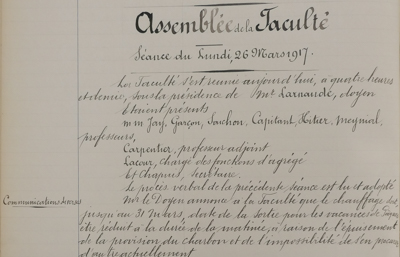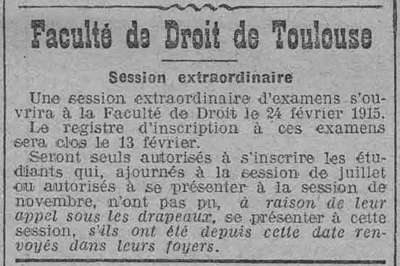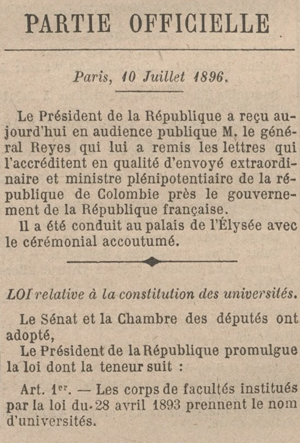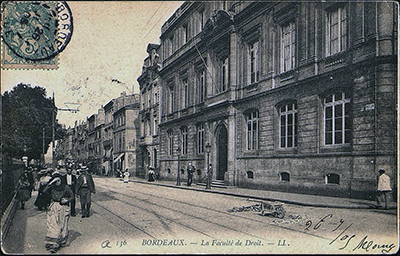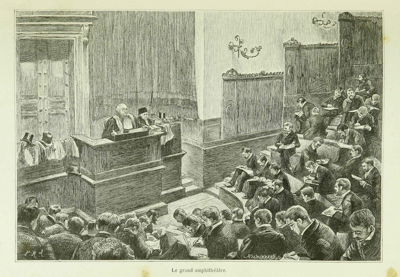Summer 1914 : it is war Before the start of the academic year in November, only the summer French courses for international students were disrupted by the outbreak of war in August. This summer school took place in two sessions, one in July and the other in August, in Boulogne-sur-Mer. In the summer of 1914, 216 students were enrolled. The courses covered literature, French civilization, phonetics, grammar, style, reading, conversation and translation. Of the 143 students enrolled in the July session, 69 were English, 35 were German, 14 were Russian, 7 were Austrian, 5 were Hungarian, 4 were Swedish, 2 were Dutch, 2 were Canadian, 2 were French, 1 was American, 1 was Colombian and 1 was Finnish. The secretary of the society of patronage ofpour lire la suite…
Tag: France
Daily life in the Paris Faculty of Law during the war
“In the life of a faculty, as in that of a family, events repeat themselves, almost always the same, which are the most numerous and the most necessary. Sometimes new events occur, bringing about a modification, small or large, in their organization and operation. Those are necessary as well, but they must not be too frequent, lest they bring about too great an instability into an existence whose continuity and regularity are, in a way, the fundamental principle. The life of bodies, as that of families thus includes happy and unhappy events alike. Would it really be life otherwise ?” ; these remarks were expressed by Dean Ferdinand Larnaude in 1921, in the annual report on higher education institutions of the Paris Academy (law school). Larnaude, whopour lire la suite…
The Toulouse Faculty of Law in the war
On June 9, 1929, on the occasion of the commemoration of the 700th anniversary of the creation of the University of Toulouse, law historian Joseph Declareuil (1863-1938) recounted the history of the institution. He mentioned “twenty generations of masters and students who successively appeared, thought, acted, fought to acquire knowledge, then vanished under the veil of the fleeting time” and proposed to “draw some lessons from this great past”. Unwinding the thread of the long history of the Studium Tolosanum, he focused little on the law school during the late 19th and early 20th centuries. He quickly alludes to new chairs and courses, the creation of institutes, relations with practical law and notarial schools, and the reformation of the University of Toulouse in 1906. He,pour lire la suite…
Dissolved, temporary, consecrated : the difficult resurgence of the Bordeaux Faculty of Law
Despite being a pioneer of higher education with its auditorium and the lectures of Ausonius ( ? 310-394) in the 4th century of our era, Bordeaux had to wait a long time before the opening of its first official university. A rich city and major trading port, it only became a place of legal education during the 15th century with the creation of the Universitas Burdiagalensis. Its structure remained substantially the same for nearly 350 years before being swept away by revolutionary impulses. The city produced many renowned jurists such as Nicolas Boerius (1469-1539), Bernard Automne (1574 ?-1666), Étienne Cleirac (1583-1657), Abraham Lapeyrère (1598 ?-1690 ?), or even famous member of parliament Charles Louis de Secondat, baron of La Brède and Montesquieu (1689-1755). In Bordeaux as in many otherpour lire la suite…
Toulouse and Paris : the ties of competing law schools
Paris and Toulouse are the two most important law schools in France. Throughout the 19th century, they dominated the French academic landscape, notably by their attractiveness, their enrollment numbers and the degrees they awarded. They and a dozen other legal faculties on the territory created by Napoleon from as early as 1804 shared the same professionalization objective : they organized examinations and delivered the titles necessary for the practice of legal and judicial professions (magistrates, lawyers, teachers, etc.) to children of the most privileged classes. Everywhere, education was focused on civil law, Roman law and procedural law. Little to no provision was made for other branches of law (administrative law, commercial law or legal history). The contemporaries, among whom some famous writers (Balzac, Zola and others),pour lire la suite…


